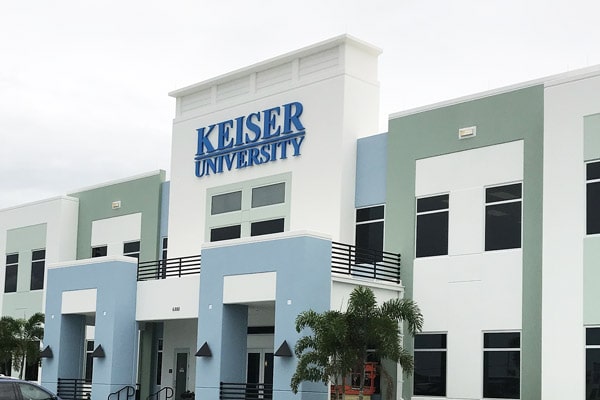Nuclear Medicine Technology, AS (NMT)
Keiser University’s Associate of Science degree in Nuclear Medicine Technology instructs students in the use of radioactive material to visualize diagnose and treat pathology through proper utilization of specialized equipment and techniques.
The program provides entry-level lectures in positron imaging tomography (PET) and computerized axial tomography (CT). Graduates are eligible to sit for certification examinations given by the American Registry of Radiologic Technologists (ARRT-N) and the Nuclear Medicine Technology Certification Board (NMTCB).
Nuclear Medicine Technology Video
Program Goals
- Graduates will be able to perform entry-level nuclear medicine technology tasks
- Graduates will demonstrate the ability to act in a professional and ethical manner as an entry-level nuclear medicine technologist
- Graduates will be eligible to sit for and pass a national credentialing examination
Program Mission Statement
The Mission of the Keiser University Nuclear Medicine Associate of Science degree program is to prepare competent graduates for a rewarding career as a nuclear medicine technologist. The program emphasizes the professional and technical skills necessary in theperformance of nuclear medicine procedures; while instilling a commitment to life-long learning. The program facilitates the learningopportunities essential to the development of a skilled and empathetic imaging professional in a collaborative, team-centered healthcare environment. The program’s graduates are eligible to take national certification examinations administered by the Nuclear Medicine Technology Certification Board and the American Registry of Radiologic Technologists.
Student Learning Objectives/Outcomes
- Students will develop verbal and written communication skills to effectively interact within a healthcare setting
- Students will demonstrate knowledge of ALARA practices and regulatory practices relevant to all aspects of radiation safety in Nuclear Medicine Technology
- Students will demonstrate knowledge of professional ethical practices and appropriate patient care in a team centered healthcare setting
- Students will demonstrate proficiency in related math and physics content
- Students will demonstrate successful performance in nuclear medicine procedures
Prerequisites for Major Courses
- Background check and drug screening when applicable;
- Successful completion of general education courses with a grade of “C” or better in each course. Successful completion of the following prerequisite courses: BSC2085C, BSC2086C, PHY2001, MAC2105 and CHEM2045/L;
- Cumulative grade average of 3.0 on a scale of 4.0.
Program Outline
To receive an Associate of Science degree in Nuclear Medicine Technology, students must earn a total of 93.0 credit hours. Each course in Nuclear Medicine Technology is a prerequisite for the subsequent course and must be completed with a grade of “C” or higher to proceed successfully through the program.
Program requirements are as follows:
Lower Division Courses
| Nuclear Medicine Technology Major Courses (63.0 credit hours) | |
|---|---|
| Nuclear Medicine Seminar | 5.0 credit hours |
| Radiation Safety and Health Physics | 5.0 credit hours |
| Nuclear Medicine Instrumentation | 5.0 credit hours |
| Nuclear Medicine Methodology I | 5.0 credit hours |
| Nuclear Medicine Physics | 5.0 credit hours |
| Nuclear Medicine Methodology II | 5.0 credit hours |
| PET/CT Procedures and Radiopharmacy | 5.0 credit hours |
| Methodology III | 5.0 credit hours |
| Clinical Rotation I | 3.0 credit hours |
| Clinical Rotation II | 3.0 credit hours |
| Clinical Rotation III | 3.0 credit hours |
| Clinical Rotation IV | 3.0 credit hours |
| Clinical Rotation V | 3.0 credit hours |
| Clinical Rotation VI | 3.0 credit hours |
| Nuclear Medicine Capstone Course | 5.0 credit hours |
| Behavioral/Social Science (3.0 credit hours) | |
|---|---|
| Introduction to Psychology | 3.0 credit hours |
| Communications (3.0 credit hours) | |
|---|---|
| Speech Communication | 3.0 credit hours |
| English (3.0 Credit Hours) | |
|---|---|
| English Composition I | 3.0 credit hours |
| English Composition II | 3.0 credit hours |
| Humanities/Fine Arts (3.0 credit hours) | |
|---|---|
| American Literature | 3.0 credit hours |
| English Literature | 3.0 credit hours |
| Mathematics (3.0 credit hours) | |
|---|---|
| College Algebra | 3.0 credit hours |
| Natural Science (15.0 credit hours) | |
|---|---|
| Human Anatomy and Physiology I | 4.0 credit hours |
| Human Anatomy and Physiology II | 4.0 credit hours |
| General Chemistry | 3.0 credit hours |
| General Chemistry Lab | 1.0 credit hour |
| General Physics | 3.0 credit hours |
Note: Each course in the Nuclear Medicine Technology major is a prerequisite for the subsequent course and therefore must be passed with a minimum "C" grade in order to proceed successfully through the program.
Program Outcomes
Published Outcomes
Graduate achievement data is an indicator of program effectiveness, demonstrating the extent to which a program achieves its goals. The current report on graduate achievement data, identified by program, is available on the JRCNMT website by clicking on the following link: Graduate Outcomes Report.









